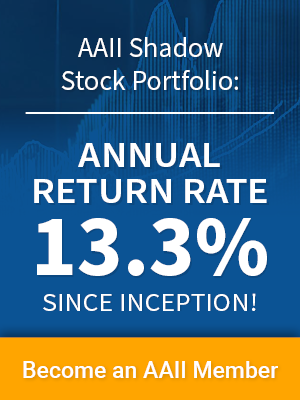Based on key financial metrics such as the price-to-sales ratio, shareholder yield and the price-earnings ratio, the following 4 stocks made the list for top value stocks in the Specialty Retail industry. Those looking for value stocks to add to their portfolio may want to use this list as a starting point for further investment research.
Why Focus on Undervalued Specialty Retail Stocks?
Value investors seek to buy stocks at a discount to their intrinsic value. Long-term returns show that such strategies are advantageous. Value stocks, as a group, tend to outperform growth stocks over extended periods of time. Typically, value investors perform financial analysis of numerous metrics, don’t follow the herd and are long-term investors.
AAII’s A+ Investor Value Grade is derived from a stock’s Value Score. The Value Score is the percentile rank of the average of the percentile ranks of the price-to-sales ratio, price-earnings ratio, enterprise-value-to-EBITDA (EV/EBITDA) ratio, shareholder yield, price-to-book-value ratio and price-to-free-cash-flow ratio. The score is variable, meaning it can consider all six ratios or, should any of the six ratios not be valid, the remaining ratios that are valid. To be assigned a Value Score, stocks must have a valid (non-null) ratio and corresponding ranking for at least two of the six valuation ratios.
What Goes Into AAII’s Value Grade?
Stock evaluation requires access to huge amounts of data as well as the knowledge and time to sift through it all, make sense of financial ratios, read income statements and analyze recent stock movement. AAII created A+ Investor, a robust data suite that condenses data research in an actionable and customizable way suitable for investors of all knowledge levels, to help investors with that task.
AAII’s proprietary stock grades come with A+ Investor. These offer intuitive A–F grades for more than just value. It is possible for a stock to appear cheap based on one valuation metric but appear expensive on another. It is also possible for one valuation ratio to be associated with outperforming stocks during certain periods of time but not others. Some stocks may even have null values for certain metrics like the price-earnings ratio or the price-to-book ratio but not others. An example of this would be a company with losses instead of profits or a negative book value because of heavy borrowing. Negative earnings or book value result in non-meaningful ratios that are left blank or null.
Click the button below to learn more about A+ Investor and subscribe today.

4 Undervalued Specialty Retail Stocks
Of course, there are countless value stocks that are worth mentioning, but this is a concise list of the top 4 undervalued stocks in the Specialty Retail industry for Monday, November 24, 2025. Let’s take a closer look at their individual scores to see how they measure up against each other and the Specialty Retail industry median.
| Company | Ticker | Price/Sales | Price/Earnings | EV/EBITDA | Shareholder Yield | Price/Book Value | Price/Free Cash Flow | Value Grade |
| Lithia Motors, Inc. | LAD | 0.21 | 8.7 | 11.3 | 6.3% | 1.09 | na | A |
| LuxExperience B.V. | LUXE | 0.61 | 1.7 | 0.9 | (68.5%) | 0.83 | na | A |
| Monro, Inc. | MNRO | 0.46 | na | 12.5 | 5.9% | 0.92 | 40.9 | B |
| Shoe Carnival, Inc. | SCVL | 0.39 | 7.3 | 10.1 | 2.9% | 0.68 | 57.4 | A |
The Value Grade is assigned based on how each stock’s composite valuation compares to all other stocks.
The process for assigning grades starts with each variable for a given stock. The percentile rankings for all valid ratios that a stock has are calculated. So, for instance, a stock could have a price-to-book ranking in the 43rd percentile, a price-earnings ranking in the 67th percentile, a price-to-sales ranking in the 23rd percentile, etc. Then, those rankings are averaged for each stock. (A minimum of two valid variables are required, though all six will be used if available.)
Once the average of the individual variables is calculated, that average is ranked against all stocks. Put another way, each stock’s composite valuation is compared to all other stocks. These ranks are then sorted into quintiles from the cheapest 20% (a grade of A) to the most expensive 20% (a grade of F).
As always, we recommend that you conduct proper due diligence and research before investing in any security. We also suggest that investors utilize numerous grades, not just value, when it comes to deciding whether a company is a good fit for their allocation needs.
Lithia Motors, Inc.’s Value Grade
Value Grade:
| Metric | Score | LAD | Industry Median |
| Price/Sales | 9 | 0.21 | 0.36 |
| Price/Earnings | 13 | 8.7 | 19.6 |
| EV/EBITDA | 43 | 11.3 | 13.5 |
| Shareholder Yield | 12 | 6.3% | 1.0% |
| Price/Book Value | 30 | 1.09 | 1.80 |
| Price/Free Cash Flow | na | na | 22.9 |
Lithia Motors, Inc. operates as an automotive retailer in the United States, the United Kingdom, and Canada. The company operates in two segments, Vehicle Operations and Financing Operations. It offers a range of products and services fulfilling the entire vehicle ownership lifecycle, including new and used vehicles, financing and insurance products, and aftersales automotive repair and maintenance services. The company provides its products and services through a network of physical locations, e-commerce platforms, captive finance solutions, fleet management offerings, and other synergistic adjacencies Lithia Motors, Inc. was founded in 1946 and is headquartered in Medford, Oregon.
Stocks with a Value Score from 81 to 100 are considered deep value, those with a score between 61 and 80 are value and so on.
Lithia Motors, Inc. has a Value Score of 94, which is considered to be undervalued.
When you look at Lithia Motors, Inc.’s price-to-sales ratio at 0.21 compared to the industry median at 0.36, this company has a lower price relative to revenue compared to its peers. This could make Lithia Motors, Inc.’s stock more attractive for value investors.
Lithia Motors, Inc.’s price-earnings ratio is 8.70 compared to the industry median at 19.60. This means it has a lower share price relative to earnings compared to its peers. This could make Lithia Motors, Inc. more attractive for value investors.
Now, let’s assess Lithia Motors, Inc.’s EV/EBITDA ratio, also known as enterprise multiple. At 11.3, when compared to the industry median of 13.5, the company may be considered undervalued in relation to its peers. Value investors could use the enterprise multiple to identify stocks that are considered overvalued or undervalued relative to their industry.
Shareholder yield is the sum of a stock’s dividend yield (paid over previous 12 months minus special dividends) and the percentage of net share buybacks over the previous 12 months. Lithia Motors, Inc.’s shareholder yield is higher than its industry median ratio of 0.95%. Value investors may look for an attractive shareholder yield because it can be a powerful tool for identifying if the company has a good management team.
As one of the most common value metrics, the price-to-book ratio evaluates a company’s current market price relative to its book value. Lithia Motors, Inc.’s price-to-book ratio is lower than its industry median ratio of 1.80. This could make Lithia Motors, Inc. more attractive to investors looking for a new addition to their portfolio.
LuxExperience B.V.’s Value Grade
Value Grade:
| Metric | Score | LUXE | Industry Median |
| Price/Sales | 23 | 0.61 | 0.36 |
| Price/Earnings | 1 | 1.7 | 19.6 |
| EV/EBITDA | 2 | 0.9 | 13.5 |
| Shareholder Yield | 91 | (68.5%) | 1.0% |
| Price/Book Value | 19 | 0.83 | 1.80 |
| Price/Free Cash Flow | na | na | 22.9 |
LuxExperience B.V., through its subsidiary, operates digital platform for the luxury fashion in Germany, the United States, Europe, Middle East, Japan, mainland China, Hong Kong SAR, China, and internationally. The company offers womenswear, menswear, kidswear, fine jewelry, watches, fine jewelry and lifestyle products under the Mytheresa, NET-A-PORTER, MR PORTER, YOOX, and the OUTNET brand name. The company was formerly known as MYT Netherlands Parent B.V. and changed its name to LuxExperience B.V. in May 2025. LuxExperience B.V. was founded in 1987 and is based in Munich, Germany.
Stocks with a Value Score from 81 to 100 are considered deep value, those with a score between 61 and 80 are value and so on.
LuxExperience B.V. has a Value Score of 87, which is considered to be undervalued.
LuxExperience B.V.’s price-earnings ratio is 1.7 compared to the industry median at 19.6. This means that it has a lower price relative to its earnings compared to its peers. This makes LuxExperience B.V. more attractive for value investors.
LuxExperience B.V.’s price-to-book ratio is higher than its peers. This could make LuxExperience B.V. less attractive for value investors when compared to the industry median at 1.80.
You can read more about LuxExperience B.V.’s key financial metrics like shareholder yield, price-to-free-cash-flow and EV/EBITDA ratio, or learn more about its Momentum and Growth Grades, by subscribing to A+ Investor.
Monro, Inc.’s Value Grade
Value Grade:
| Metric | Score | MNRO | Industry Median |
| Price/Sales | 18 | 0.46 | 0.36 |
| Price/Earnings | na | na | 19.6 |
| EV/EBITDA | 49 | 12.5 | 13.5 |
| Shareholder Yield | 13 | 5.9% | 1.0% |
| Price/Book Value | 23 | 0.92 | 1.80 |
| Price/Free Cash Flow | 77 | 40.9 | 22.9 |
Monro, Inc. engages in the operation of retail tire and automotive repair stores in the United States. It offers replacement tires and tire related services; automotive undercar repair services; and routine maintenance services primarily to passenger cars, light trucks, and vans. The company also provides other products and services for brakes; mufflers and exhaust systems; and steering, drive train, suspension, and wheel alignment. It operates its stores under the Monro Auto Service and Tire Centers, Tire Choice Auto Service Centers, Mr. Tire Auto Service Centers, Car-X Tire & Auto, Tire Warehouse Tires for Less, Ken Towery's Tire & Auto Care, Mountain View Tire & Auto Service, and Tire Barn Warehouse brand names. The company was founded in 1957 and is headquartered in Fairport, New York.
Stocks with a Value Score from 81 to 100 are considered deep value, those with a score between 61 and 80 are value and so on.
Monro, Inc. has a Value Score of 72, which is considered to be undervalued.
Monro, Inc.’s price-to-book ratio is higher than its peers. This could make Monro, Inc. less attractive for value investors when compared to the industry median at 1.80.
You can read more about Monro, Inc.’s key financial metrics like shareholder yield, price-to-free-cash-flow and EV/EBITDA ratio, or learn more about its Momentum and Growth Grades, by subscribing to A+ Investor.
Shoe Carnival, Inc.’s Value Grade
Value Grade:
| Metric | Score | SCVL | Industry Median |
| Price/Sales | 16 | 0.39 | 0.36 |
| Price/Earnings | 8 | 7.3 | 19.6 |
| EV/EBITDA | 36 | 10.1 | 13.5 |
| Shareholder Yield | 27 | 2.9% | 1.0% |
| Price/Book Value | 14 | 0.68 | 1.80 |
| Price/Free Cash Flow | 85 | 57.4 | 22.9 |
Shoe Carnival, Inc., together with its subsidiaries, operates as a family footwear retailer in the United States. The company offers various products, including dress and casual shoes, sandals, boots, and athletic shoes; and non-athletics for men's, women's and children's shoes, as well as accessories. It also operates stores. The company sells its products through www.shoecarnival.com and www.shoestation.com, as well as through related mobile app. Shoe Carnival, Inc. was founded in 1978 and is headquartered in Evansville, Indiana.
Stocks with a Value Score from 81 to 100 are considered deep value, those with a score between 61 and 80 are value and so on.
Shoe Carnival, Inc. has a Value Score of 81, which is considered to be undervalued.
Shoe Carnival, Inc.’s price-earnings ratio is 7.3 compared to the industry median at 19.6. This means that it has a lower price relative to its earnings compared to its peers. This makes Shoe Carnival, Inc. more attractive for value investors.
Shoe Carnival, Inc.’s price-to-book ratio is higher than its peers. This could make Shoe Carnival, Inc. less attractive for value investors when compared to the industry median at 1.80.
You can read more about Shoe Carnival, Inc.’s key financial metrics like shareholder yield, price-to-free-cash-flow and EV/EBITDA ratio, or learn more about its Momentum and Growth Grades, by subscribing to A+ Investor.

Other Specialty Retail Stock Grades
Value is just one of the five Stock Grades included in our A+ Investor service. AAII members can see the top-graded stocks—those with grades of A or B for value, growth, momentum, earnings estimate revisions and quality—on the A+ Stock Grades Screener.
Also, if you want full access to all of AAII’s premium services, you can subscribe to one convenient bundled plan called AAII Platinum where you can try out A+ Investor, AAII Dividend Investing, the Stock Superstars Report, Growth Investing and VMQ Stocks. With the other premium services, you can dive deep into additional metrics, portfolios, commentary and information about Specialty Retail stocks as well as other industrys.
Choosing Which of the 4 Best Specialty Retail Stocks Is Right for You
Choosing which value stocks to invest in will ultimately depend on your individual goals and allocation; however, comparing similar value stocks in the same industry can help you analyze which might be better investments for you in the long run. So, let’s take a look at the Value Grade for all of our stocks.
- Lithia Motors, Inc. stock has a Value Grade of A.
- LuxExperience B.V. stock has a Value Grade of A.
- Monro, Inc. stock has a Value Grade of B.
- Shoe Carnival, Inc. stock has a Value Grade of A.
Now that you have a bit more background about each of the 4 undervalued stocks in the Specialty Retail industry as well as their overall grades, it’s time for you to conduct additional research to see if these could fit your portfolio needs based on your goals and risk tolerance. AAII can help you figure out both and identify which investments align with what works best for you.
We do so through a program of education that teaches you to invest for yourself and become an effective manager of your own wealth—no more relying on others for your financial independence. You can rely on AAII for timeless articles on financial planning and stock-picking, unbiased research and actionable analysis that makes you a better investor.
A+ Investor adds to that qualitative teaching by giving you a powerful data suite that helps you whittle down investment decisions to find stocks, exchange-traded funds (ETFs) or mutual funds that meet your needs.

Additional Resources About Specialty Retail Stocks
Want to learn more about Specialty Retail stocks to see if they could be the right investment for you? Check out some additional resources and articles to help you on your financial journey.
- 4 Undervalued Specialty Retail Stocks for Monday, November 24
- Is Lowe's Companies, Inc. (LOW) Overvalued?
- Is The TJX Companies, Inc. (TJX) Overvalued?
- 5 Undervalued Specialty Retail Stocks for Friday, November 21
AAII Disclaimer
We make no representations or warranties that any investor will, or is likely to, achieve profits similar to those shown, because past, hypothetical or simulated performance is not necessarily indicative of future results. Before making an investment decision, you should consider your circumstances and whether the information on our content is applicable to your situation. This information was prepared in good faith and we accept no liability for any errors or omissions. The full disclaimer can be read here.
 Included With AAII Platinum
Included With AAII Platinum
Yield Screen: 8.7% Compared to S&P 500
at only 6.9%
Since Inception. Data as of 12/31/2024.

769.3% Stock Superstars Portfolio Total Return Since Inception

U.S. Index ETF (IYY)
SSR Group 3 O'Shaughnessy portfolio has a 411.2% gain since inception performance compared to IYY at only 119.1%% Performance as of 11/29/24.
FREE REPORT

BECOME A MEMBER FOR ONLY $2
Get access to powerful investment discovery tools and a wealth of investment education to help you achieve your financial goals.




